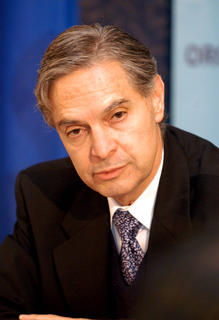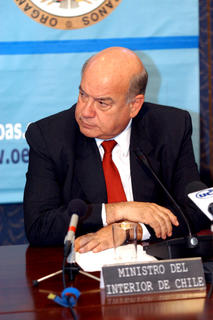The Fourth Summit of the Americas convenes in Argentina in early November. However, unlike previous summits at which America set and dominated the agenda, this one holds the prospect of Venezuela emerging as a formidable player in determining what matters will command the attention of participating delegates: A seismic change in hemispheric geopolitics that stems from a cold war on American influence that is being fought in the shadows of America’s war on terror.
For more than 2 years, insurgents in Iraq have bedeviled the military [super] power of the United States. But for much of that time, insurgents right in America’s backyard have bedeviled its political sphere of influence. Moreover, whilst America was busy fomenting democratic revolutions throughout the former Soviet Union and the Middle East, China was systematically nurturing the totalitarian aspirations of socialist regimes throughout the Americas and Africa. And, any astute observer of strategic international geopolitics appreciates that these developments represent the opening salvos in the 21st Century Cold War between the U.S. and China.
Therefore, it must have come as a rude awakening for America when it suffered a humiliating defeat a few months ago in the first battle against its new ideological nemesis: A battle which pitted America’s unilateral push for democracy at all costs against China’s cooperative ventures for economic prosperity and security no matter the political system.
Shifting allegiances within this organization may do more to undermine Bush’s worldwide democracy crusade than terror strikes by Al Qaeda…
This battle – fought by proxy as superpower confrontations invariably are – was for the leadership of the Organization of the American States (OAS). [I should note here that just as the Soviet Union used Cuba to undermine American influence in the Americas during the 20th Century Cold War, China is now using Venezuela to do the same in this cold war.] The OAS is a 34-member organization – representing all the countries of the Americas except Cuba (which was expelled in 1962). It promotes democracy and regional cooperation on issues ranging from poverty reduction to drug trafficking. Therefore, it is particularly ironic (and especially galling to President Bush) that a regional insurgency has developed in opposition to America’s demands that member states adhere to its fundamentalist decrees on democracy.
It is prima facie revolutionary, however, that there was even a fight over the leadership of the OAS. Because during the 60-year history of this organisation, Washington’s influence has been so dominant that its favoured candidate was always elected by acclamation.
But when the leadership position became vacant this time (because persistent allegations of corruption dating back to his presidency of Costa Rica forced Miguel Angel Rodriguez to resign in October 2004 – after less than a month into his 5-year term), America’s choice to replace him was Francisco Flores, the former President of El Salvador. Political pundits speculated at the time that he was nominated primarily because of his zealous support for the American invasion of Iraq. Nonetheless, Bush Administration officials soon prevailed upon Flores to withdraw his candidacy when it became clear that, despite (or to spite) ritual pressure from Washington, OAS members were not lining up to support him as expected.
 Luis Ernesto Derbez of Mexico– America’s man by default…
Luis Ernesto Derbez of Mexico– America’s man by default…
Battle lines were then drawn as the U.S. offered wilted carrots (like making discredited Caribbean Basin Initiatives more palatable) to woo disaffected OAS members to support its default candidate – Luis Ernesto Derbez of Mexico; whilst Venezuela offered cheap oil, direct investments (pursuant to China’s geopolitical strategy) and the irresistible opportunity to kick sand in the eyes of America to woo them to support its anti-America candidate – Jose Miguel Insulza of Chile. And, just as it was in cold war battles between the U.S. and Soviet Union, small nations held the key to success for both America and Venezuela in this one.
Therefore, as one can well imagine, the 14 states of the Commonwealth Caribbean (CARICOM) were lobbied heavily for their pivotal (bloc) vote. And, it was in this context that the invisible hand of China frustrated America’s campaign to reassert (and reshape) its customary sphere of influence.
 Jose Miguel Insulza of Chile – Venezuela’s man by acclaim!
Jose Miguel Insulza of Chile – Venezuela’s man by acclaim!
Alas, classic hubris precluded America from appreciating how easy it would be for CARICOM members to pledge their allegiance to Venezuela in this OAS showdown. In fact, their decision was made almost by default since U.S. Secretary of State Condoleezza Rice merely nagged the right ear of CARICOM officials with democratic platitudes and condemnation of Chile’s socialist economic policies as reasons to oppose Insulza. Whereas, Venezuelan President Hugo Chavez whispered sweet nothings in their left ear about how Venezuela’s oil and China’s cash would guarantee not only their political independence but also their sustained economic development as reasons to support him. Besides, given the billions of dollars that China had already invested throughout the Americas, Chavez had the persuasive edge of being able to say to CARICOM leaders that, unlike America, China has demonstrated its willingness to put its money where its mouth is.
But, notwithstanding the wooing by Chavez, the resentment CARICOM countries harboured from years of being bullied, neglected and disrespected by the U.S. was a greater factor in determining their allegiances in this battle. And, it’s important to note that this resentment predated America’s preoccupation with its war on terror. Because the tipping point for regional disaffection with the U.S. took place in mid-1990s – when the Clinton Administration supported American multinational corporations in their Banana War against Caribbean countries over access to the lucrative European banana market. Moreover, CARICOM members became even more disaffected when the U.S. decided, unilaterally, to facilitate the ouster of Haitian President Jean-Bertrand Aristide despite their pleas of support for this democratically elected leader.
Therefore, since China had effectively bought political dominion over the Caribbean (and is fast becoming the largest direct investor in Latin America), Venezuela was ab
le to invoke China as a Trojan horse to overcome traditional U.S. influence among OAS members.
Beyond this battle, however, America ignores its waning influence throughout the Americas at its peril. Because one cannot exaggerate the transformative and empowering implications (for CARICOM and Latin America) that flow from America’s failure to command enough votes to win a geopolitical battle against Venezuela for the leadership of the OAS. And, just as images in Iraq today suggest that America did not learn from its defeat in Vietnam, indications are that it will also not heed the lessons of this humiliation defeat.
After all, when it became clear the Venezuela’s man (Insulza) would win, President Bush did not trouble himself with the substantive concerns that drove CARICOM and other states into Venezuela’s camp. Instead, he simply dispatched Dr. Condoleezza Rice (to enemy territory in Chile) to broker a diplomatic surrender that would allow America to cut its losses and still declare victory – just as it did upon retreating from Vietnam.
Secretary Rice in Chile: Doing her best to accept America’s defeat whilst appearing (still) in charge…
Accordingly, last week, after securing fatuous (face saving) promises from Insulza “to keep pressure on Cuba and Venezuela to pursue democratic reforms,” Rice announced that America would support him to be the next secretary general of the OAS. (Of course, this announcement left the Mexican candidate no choice but to concede defeat.)
And so it was that Jose Miguel Isulza was duly elected as the new Secretary General of the OAS on Monday. But his election marked not only America’s shrinking sphere of influence throughout the Americas but also the vindication of China’s mercurial and strategic approach to international relations.
Viva Chavez!
News and Politics
Leave a Reply
You must be logged in to post a comment.